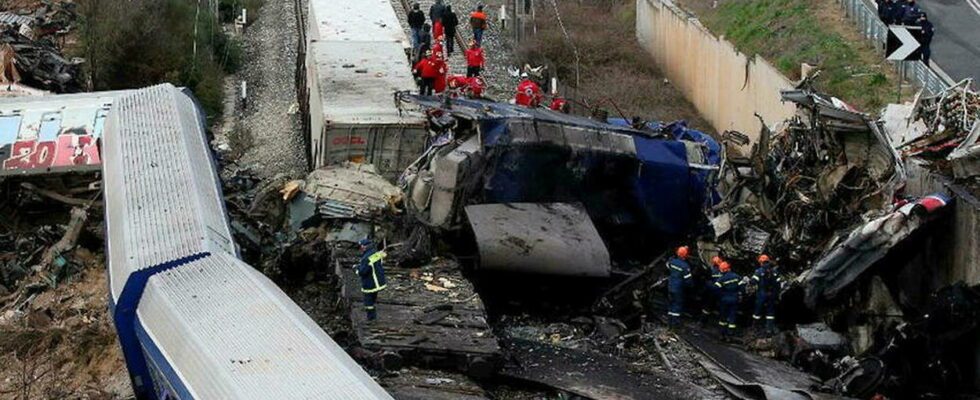Igreece experienced one of the most serious rail accidents in its history with the head-on collision between a passenger train and a freight convoy on the evening of Tuesday 28 February. The disaster, which occurred near the Tempe Valley in Thessaly, on the main railway line linking Athens to Thessaloniki, killed at least 57 people, according to a final provisional report on Thursday.
The station master, implicated in the accident, “admitted a mistake”, said government spokesman Yiannis Oikonomou on Thursday. “I think the negligence, the error was admitted by the station master himself,” he said. A few minutes later, the station master’s lawyer confirmed that he “recognizes what he did”. This 59-year-old man is being prosecuted for “negligent homicide” and “involuntary bodily harm”. If convicted, he faces life in prison.
The Intercity train with 342 passengers and 10 employees on board collided head-on with a freight convoy making the opposite journey and being on the same track, according to the first elements of the investigation. A fire then broke out: the two locomotives were destroyed and the first three cars of the passenger train derailed, pulverized in the shock. The conductors of two trains were killed instantly.
At least 46 people were killed, the majority of whom were in the first wagons, according to a Civil Protection report. Dozens of others were injured. Many of the passengers happened to be students returning to Thessaloniki after a long weekend in Greece.
“Apocalyptic” images
Teams of firefighters and rescuers who arrived on the spot reported “apocalyptic” scenes. “Once they arrived at the scene of the disaster, our teams found themselves in an apocalyptic landscape,” said Yiannis Goulas, the president of the union of first aid employees (Ekav) on the public television channel ERT on Wednesday.
“People covered in blood were running around asking for help. People littered the fields after being ejected from shattered windows,” he added.
Images of the charred wagons in a tangle of metal parts and shattered windows were broadcast live by the media. Other less damaged carriages were overturned on their sides while rescuers used ladders to try to free survivors using two huge cranes.
The apologies of the new Minister of Transport
Earlier in the day, Prime Minister Kyriakos Mitsotakis, who visited the scene, said that “everything shows that the tragedy is due, unfortunately, mainly to tragic human error”. In addition, the Minister of Transport, Kostas Karamanlis, tendered his resignation.
The new Greek Minister of Transport, Giorgos Gerapetritis, apologized on Thursday to the families of the victims of the train accident which occurred on Tuesday evening and which left 46 dead, according to a provisional report. “I would first like to apologize to the families of those who lost their lives while making a complete self-criticism of the political system and the state,” he said as serious failures in the rail network were pointed out from the finger.
Apologies that did not calm the ardor of the 700 people, according to the police, who gathered Thursday evening outside the headquarters of the Greek railway company Hellenic Train in Athens to protest against the failures which led to the deadly train crash Tuesday night. The demonstrators observed a minute of silence in memory of the many victims.
Some 2,000 demonstrators also gathered Thursday evening in Thessaloniki, northern Greece, to protest against the failures that led to this deadly train disaster. The situation was somewhat tense. Stones and Molotov cocktails were thrown but calm quickly returned.
A dying rail network
The public rail sector in Greece, whose failures are pointed out after the accident, is experiencing “chronic weaknesses”, government spokesman Yannis Oikonomou admitted on Thursday. “The delays (in the modernization of the railways) have their origin in the chronic pathologies of the Greek public sector, in decades of weakness”, he underlined during a press briefing.
Controversy swells over the state of Greece’s rail network, which some experts say is dilapidated. The rail network is traditionally underdeveloped and obsolete, with Greeks benefiting from a dense network of coach connections. The president of the train drivers’ union, Kostas Genidounias, says that “everything is done manually, the electronic systems have not worked since 2000”.
In 2017, the Greek railway company (Trainose) was bought by the Italian public company Ferrovie Dello Stato Italiane (FS) as part of a vast program of privatizations decided by Greece’s creditors over the decade. of the financial crisis (2009-2019). Contacted by Agence France-Presse, FS did not immediately comment.
